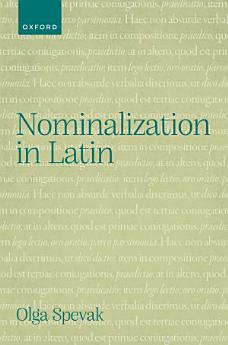Nominalization in Latin
juin 2022 · Oxford University Press
Ebook
272
Pages
family_home
Admissible
info
reportLes notes et les avis ne sont pas vérifiés En savoir plus
À propos de cet ebook
This book investigates the properties of Latin nouns that have a systematic correspondence with a clause structure - referred to as verbal nouns - on the basis of data from a range of text types, both narrative and technical. Olga Spevak explores the much-debated concepts of 'abstract nouns' in general and 'verbal derivatives' in particular, and shows that syntactic parameters are helpful in establishing a better classification for what have traditionally been called nomina actionis. She adopts a descriptive approach and provides methods and criteria for identifying these nouns and for distinguishing them from nouns with concrete reference. This distinction is important both for a full understanding of Latin texts and for the presentation of the words themselves in dictionaries. The analysis reveals that verbal nouns, gerunds, gerundives, participles in participial clauses, and in part also infinitives, are competing expressions with a low degree of 'sententiality'; they serve to condense clausal expressions, to varying extents, and they form a system in which the elements are partly overlapping and partly complementary. The fact that Latin does not have a verbal noun available for every verb can therefore be understood as simply a facet of this complex system.
Quelques mots sur l'auteur
Olga Spevak is Assistant Professor of Latin and Greek Philology at the University of Toulouse. Her interests are primarily in the areas of Latin syntax, semantics, and pragmatics, with particular focus on word order, the noun phrase, and noun valency. Her publications include Constituent Order in Classical Latin Prose (Benjamins, 2010), and, as editor, Noun Valency (Benjamins, 2014) and Pragmatic Approaches to Latin and Ancient Greek (with C. Denizot; Benjamins 2017).
Attribuez une note à ce ebook
Faites-nous part de votre avis.
Informations sur la lecture
Téléphones intelligents et tablettes
Installez l'appli Google Play Livres pour Android et iPad ou iPhone. Elle se synchronise automatiquement avec votre compte et vous permet de lire des livres en ligne ou hors connexion, où que vous soyez.
Ordinateurs portables et de bureau
Vous pouvez écouter les livres audio achetés sur Google Play en utilisant le navigateur Web de votre ordinateur.
Liseuses et autres appareils
Pour pouvoir lire des ouvrages sur des appareils utilisant la technologie e-Ink, comme les liseuses électroniques Kobo, vous devez télécharger un fichier et le transférer sur l'appareil en question. Suivez les instructions détaillées du centre d'aide pour transférer les fichiers sur les liseuses électroniques compatibles.




